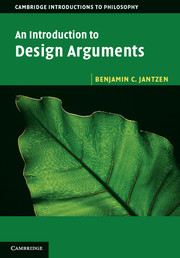Book contents
- Frontmatter
- Dedication
- Contents
- List of figures and tables
- Preface
- 1 Introduction
- 2 Preliminaries
- 3 Arguments from antiquity
- 4 Medieval arguments
- 5 The golden age of natural theology
- 6 Unusual design arguments
- 7 Hume
- 8 Paley
- 9 Darwin
- 10 Loose ends
- 11 The modern likelihood argument
- 12 Intelligent design I: irreducible complexity
- 13 Intelligent design II: specified complexity
- 14 What is complexity?
- 15 Supernatural agents and the role of laws
- 16 A brief survey of physical law
- 17 Fine tuning I: positive arguments
- 18 Fine tuning II: objections
- 19 Conclusion
- Bibliography
- Index
9 - Darwin
Published online by Cambridge University Press: 05 June 2014
- Frontmatter
- Dedication
- Contents
- List of figures and tables
- Preface
- 1 Introduction
- 2 Preliminaries
- 3 Arguments from antiquity
- 4 Medieval arguments
- 5 The golden age of natural theology
- 6 Unusual design arguments
- 7 Hume
- 8 Paley
- 9 Darwin
- 10 Loose ends
- 11 The modern likelihood argument
- 12 Intelligent design I: irreducible complexity
- 13 Intelligent design II: specified complexity
- 14 What is complexity?
- 15 Supernatural agents and the role of laws
- 16 A brief survey of physical law
- 17 Fine tuning I: positive arguments
- 18 Fine tuning II: objections
- 19 Conclusion
- Bibliography
- Index
Summary
Why dwell on Darwin and his theory of natural selection?
In this chapter we examine a scientific theory – Charles Darwin’s theory of evolution by natural selection. This might seem a like a detour. After all, a scientific theory is neither a design argument, nor a direct criticism of a design argument. However, there are two reasons that an examination of Darwin’s work is essential. First, Darwin explicitly casts his theory of the origin of biological species and their complex adaptations as a competitor to ‘special creation’, the default mode in which God was presumed to have populated the world with living things. Thus, an argument for evolution by natural selection is an argument against at least one sort of conclusion supported by design arguments. Second, Darwin’s theory presents an alternative mechanism for generating the sort of order that appears in the argument from order. It thus has a direct bearing on the plausibility of one of the most popular and durable design arguments with which we’ve met so far.
The life of Darwin
Charles Darwin shares a birth date with Abraham Lincoln: February 12, 1809. Aside from being a curious coincidence, this fact helps to situate Darwin historically. Darwin’s early life encompassed the rise and fall of Napoleon and the bloody wars that accompanied both. He witnessed the culmination of the Industrial Revolution, and from 1830 to 1846 lived through an era of electoral and governmental reform in the British Isles. Darwin’s thought was surely influenced by these events and by the profound demographic, intellectual, technological, and ideological shifts that accompanied them in nineteenth-century England.
- Type
- Chapter
- Information
- An Introduction to Design Arguments , pp. 136 - 152Publisher: Cambridge University PressPrint publication year: 2014

